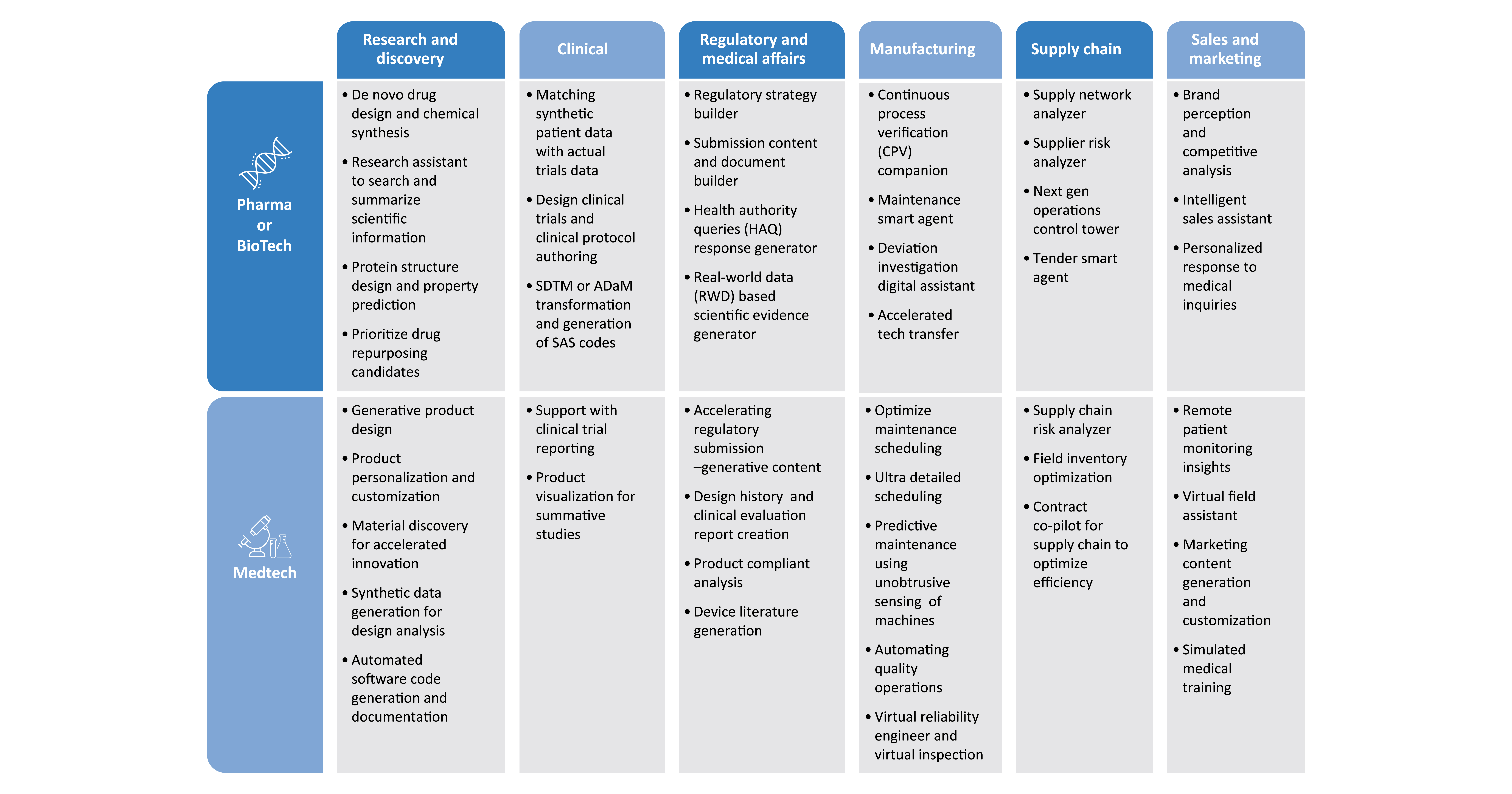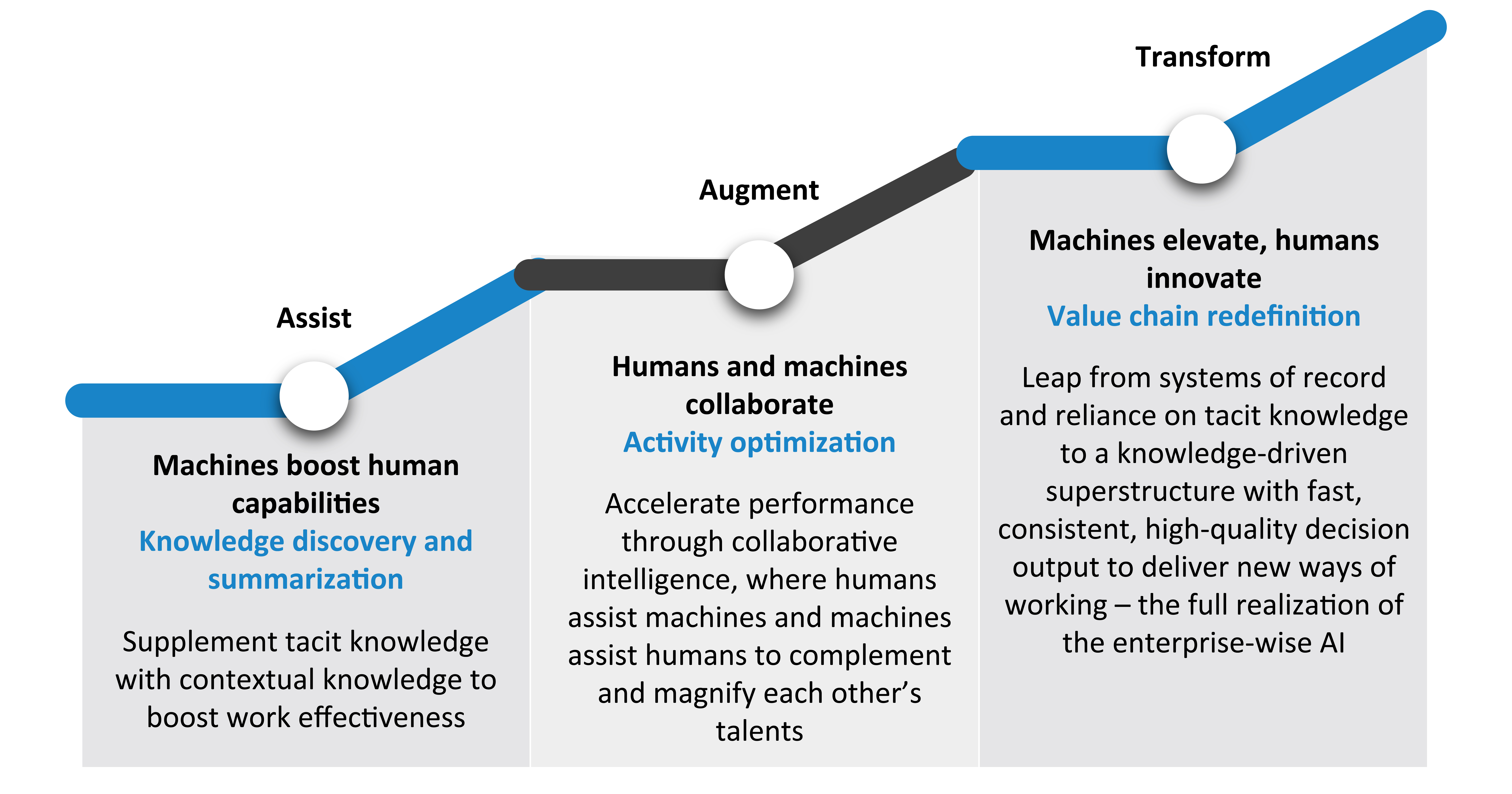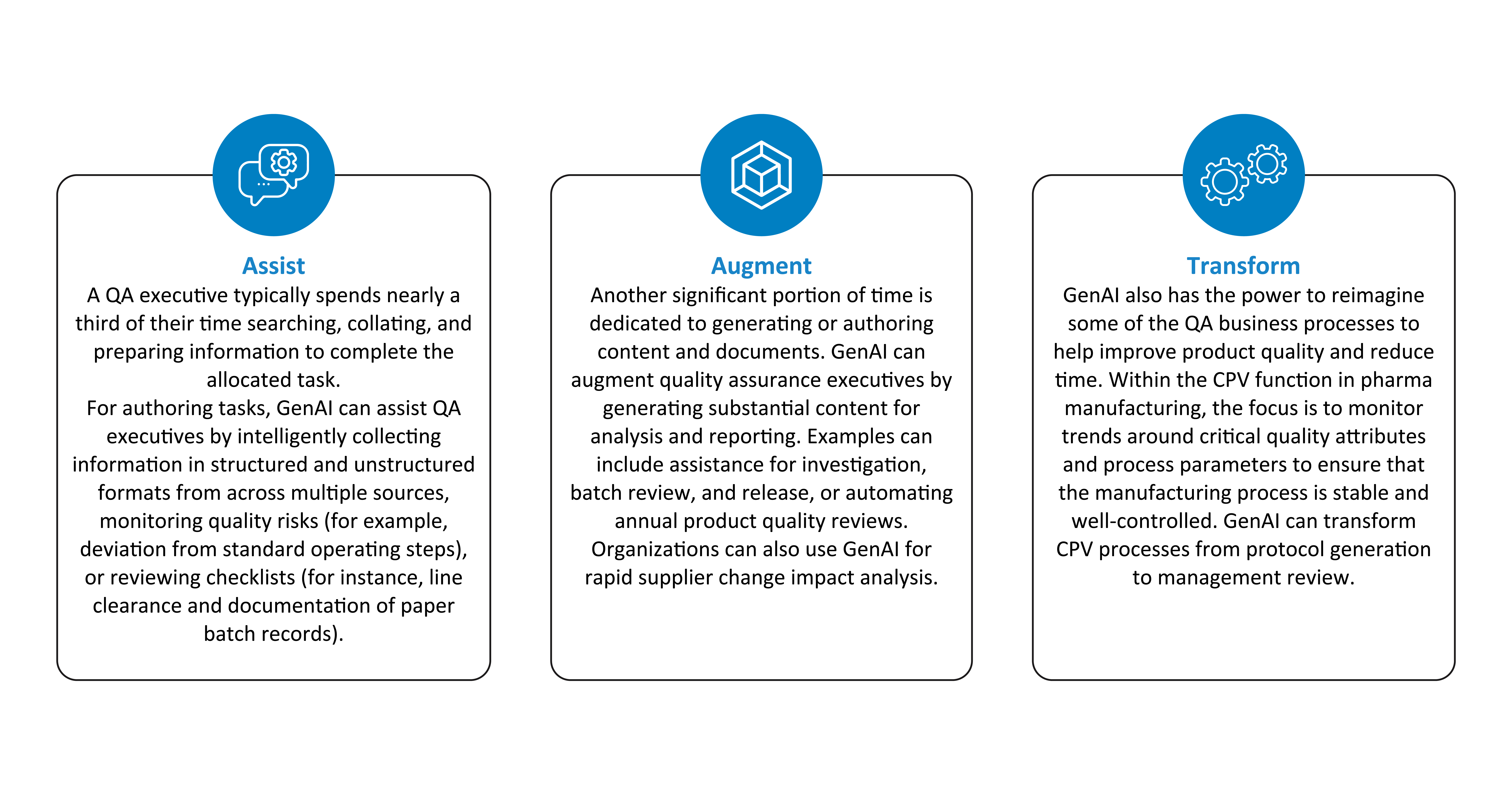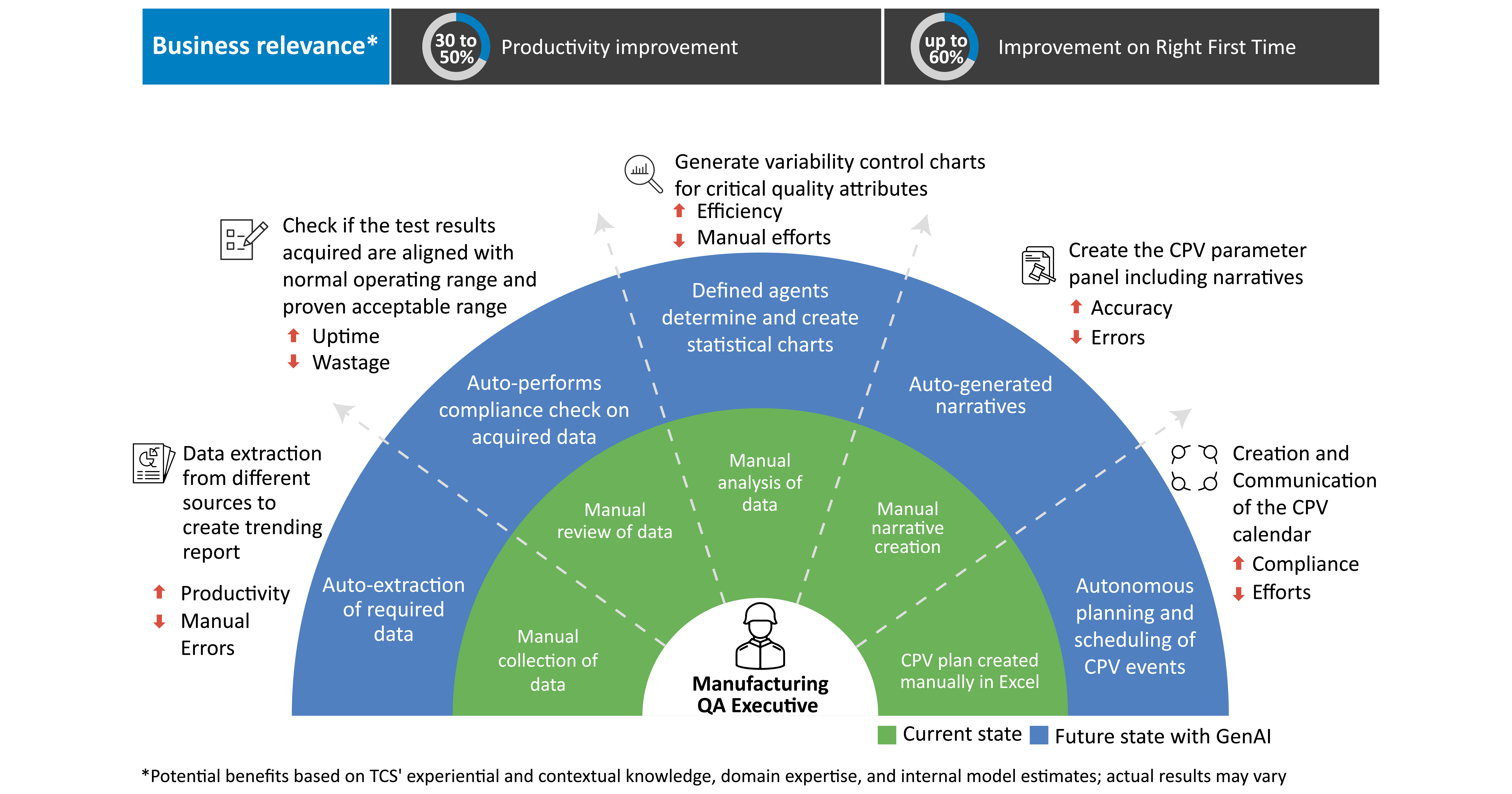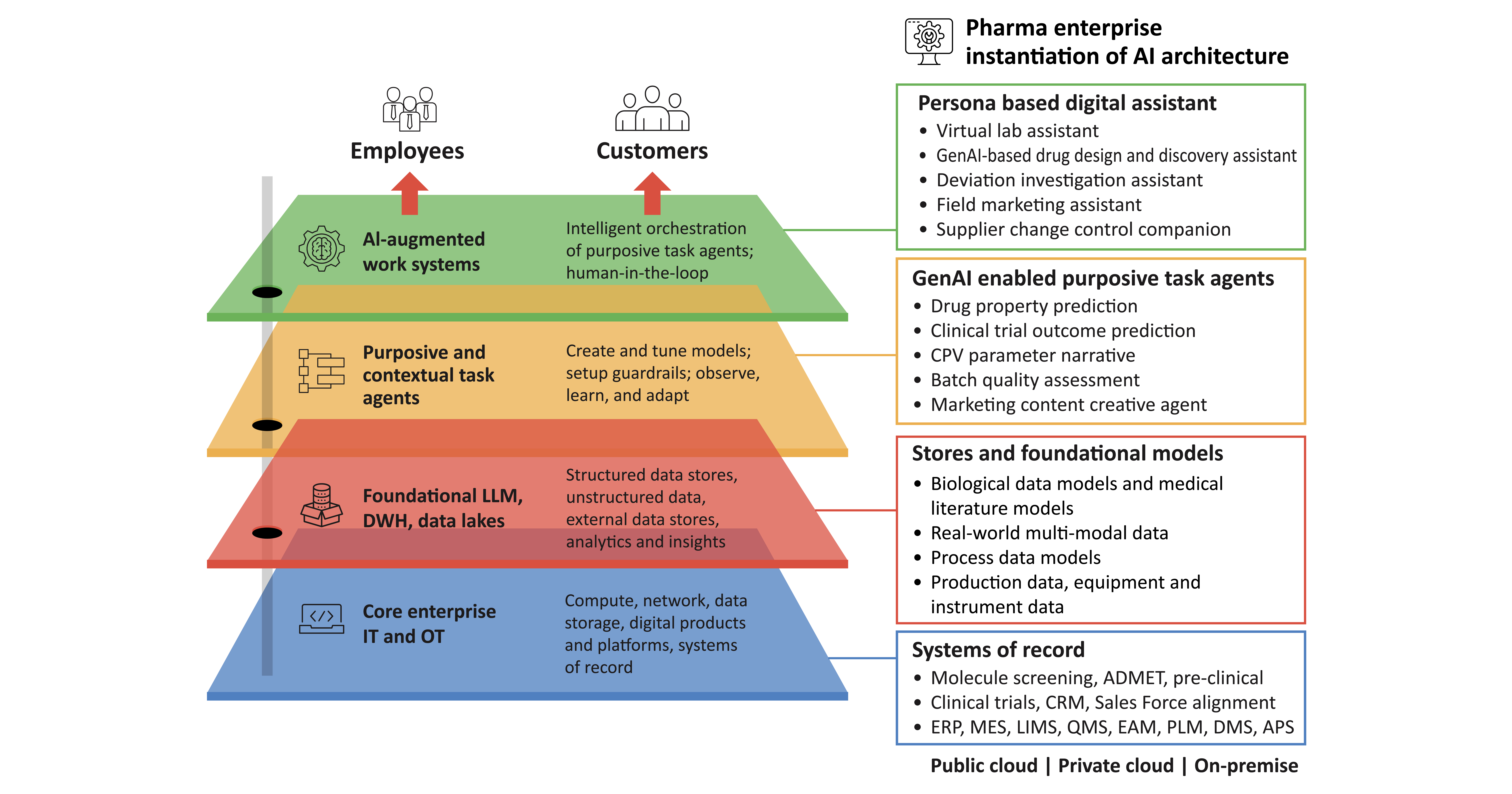Industry
HIGHLIGHTS
- GenAI technologies have tremendous potential to help life sciences organizations across the value chain improve health outcomes and quality of life, including accelerated drug discovery to faster and more efficient clinical trials, autonomous manufacturing, and improved sales and marketing effectiveness.
- As the industry considers GenAI adoption models, there are justifiable concerns around security and transparency, particularly with respect to patient safety and privacy.
- With extensive experience in working with hundreds of global companies, we offer a best-practice approach to help life sciences companies master the delicate balance of opportunity and risk to ensure successful GenAI outcomes.
On this page
The Gen AI evolution
The life sciences industry is on the cusp of a significant transformation powered by generative artificial intelligence (GenAI).
While the world is abuzz with excitement about this emerging technology, life sciences organizations are gradually realizing its enormous potential to create a better future for all.
Drug discovery and production often involve complex, time-consuming processes. GenAI has the potential to transform these processes, facilitating a more efficient drug development journey and helping to expedite the delivery of safer, more effective treatments for patients. In addition, GenAI is multiplying medical device innovations and breakthroughs that offer the promise to extend human life and improve its quality.
Yet in one of the most heavily regulated industries, there are justifiable concerns around security and transparency, particularly with respect to patient safety and privacy. As the industry considers the impacts of an AI transformation, they must also consider the best way forward.
Generative AI for life sciences value chains
Many life sciences organizations are already extensively experimenting with AI technologies.
In the TCS 2023 Global Cloud Study, an astonishing 85% of life sciences respondents said they increased investments in AI-ML in the past one to two years—the highest percentage of all industries surveyed. Meanwhile, 85% said they planned to invest in AI-ML in the next one to two years.
According to the 2024 TCS Future of Care research report, which draws from participants across the life sciences and healthcare value chain, there is widespread belief in AI's potential. Around 44% of the respondents expect that AI will be one of the three greatest value drivers of connected care. This potential is expected to help healthcare providers screen and triage patients and streamline care by automating repetitive tasks more effectively than any other capability.
Life sciences organizations are currently exploring several GenAI use cases across the value chain, including the following:
Research and discovery: With the ability to revolutionize drug discovery and new product development processes, GenAI is changing how research is done and bringing new innovative drugs to market faster, including enabling futuristic approaches for designing new molecules, such as de novo drug and protein design. In addition, analysis of varied medical data sets including trial data and real-world data can help identify drug candidates, drug interactions, and potential targets for new drugs.
Clinical trials: A faster path to clinical trial outcomes can dramatically improve treatment options. GenAI can help achieve faster, more efficacious trials by analyzing suitable patient populations, predicting outcomes, assisting in authoring protocols, and improving trial design.
Regulatory and medical affairs: GenAI can help accelerate regulatory submissions through the ability to summarize and generate vast amounts of regulatory content, drive improvements in the management of regulatory intelligence, and facilitate content reviews. Similarly, GenAI can help transform medical affairs through the ability to summarize existing publications to improve patient and health outcomes. It can also enhance various medical writing tasks, including facilitating greater knowledge by analyzing real-world evidence for better understanding and insights.
Manufacturing: By supplementing tacit knowledge with an accessible and reliable knowledge base, GenAI can drive operations productivity and process effectiveness. GenAI helps transform critical processes like quality report generation, continuous process verification, maintenance reliability, investigation support, operator training, and tech transfers to ensure the highest levels of product quality and patient safety.
Supply chain management: GenAI can enable planners and supply chain analysts to optimize inventory levels and enable real-time demand for optimized and synchronized production schedules, dynamic allocation, and distribution plans. In addition, GenAI can reimagine order management and fulfillment, enable effective tender and contract compliance analysis, propose best routes, and keep the cost-to-serve models updated and relevant. GenAI can also help determine supplier risk and potential mitigations while enabling a more responsive and resilient supply chain.
Sales and marketing: GenAI can reinforce customer centricity by creating and customizing a wide variety of content across multiple channels to elevate sales and marketing team performance throughout the customer journey. Intelligent sales assistance and hyper-personalized responses to medical inquiries can result in more targeted offers and product guidance for value-based care.
In Figure 1, we list these six focus areas, along with relevant use cases of GenAI. It is important to note that in most of these examples, intelligent technologies are digital assistants for humans and not replacements. AI will augment humans to GenAI will augment humans in their day-to-day work, empowering them to make consistently better decisions and truly innovate in a way that transforms the entire organization.
Our vision
Transforming the potential of GenAI into sustained performance is not a one-size-fits-all solution.
It requires a multidimensional strategy and an enterprise architecture optimized for cost, quality, security, and privacy while helping to ensure compliance with regulations. In short, it requires a tailored fit – not a one-size-fits-all solution.
With extensive experience in working with hundreds of global companies, we take a best-practice approach to help life sciences companies master the delicate balance of opportunity and risk to ensure successful GenAI outcomes a continuum that builds upon and reinforces each stage: assist, augment, transform (see Figures 2 and 3).
A GenAI evolution in action
We empower companies to jump-start their GenAI-led business reimagination journey.
GenAI has significant potential to enhance all aspects of the life sciences value chain. For instance, in pharma manufacturing, quality assurance (QA) is an area where GenAI can add significant value.
Based on our domain expertise, and experiential and contextual knowledge, we strongly believe GenAI has the potential to improve productivity by up to 60%, reduce quality risks, and provide an unparalleled user experience.
At a basic level, GenAI can assist, augment, and transform QA processes by detecting deviations from standard procedures, auto-generating content for annual product quality reviews, and assisting in investigations for unplanned deviations. In addition, using GenAI to completely reimagine the CPV process could ensure a faster, more reliable supply of products to market, as well as financial benefits in the range of several millions of dollars.
Navigating the complexity
How can life sciences organizations prepare themselves for an AI evolution?
It can be challenging to develop a robust business case when it’s difficult to quantify the business benefits and costs. Any solution must start with a value-augmentation opportunity for business; prioritizing top-down structures, rather than starting with technology adoption.
Further, life sciences organizations have unique regulatory, compliance, and data privacy requirements, which must be factored in during the initial stages of developing an AI model.
For life sciences organizations to fully capitalize on the potential of GenAI, it is essential to have access to a multitier architecture and integration to enterprise systems. Figure 5 shows an enterprise architecture framework for Pharma Enterprise.
The TCS advantage
Our strong partnerships help Life Sciences organizations successfully navigate GenAI transformations to drive sustained performance
Deep domain and contextual expertise: Well-established product and enterprise knowledge and technological expertise across the life sciences value chain enable robust AI applications and ongoing support.
Cross-industry experience: Working with customers across industries such as healthcare (both payer and provider), travel and transportation, retail, and insurance brings an end-to-end holistic view of enterprise business functions and know-how.
Partner ecosystems: Scale and accelerate the path to value through a network of joint solutions and established hyperscaler partnerships, extensive COIN™ network, and co-innovation facilities such as TCS Pace Port™.
Enterprise AI at scale: Our 3P strategy -- patents, products, and platforms -- and more than 100,000 trained associates help us enable enterprise AI at scale.
Evolving capabilities: TCS offers multiple areas of capabilities that infuse predictive and GenAI interventions to assist and augment existing value streams.
EXECUTIVE CHAMPIONS
Debashis Ghosh
President, Life Sciences, Healthcare, Energy, Resources, and Utilities Business Group, TCS
Vikas Jain
Vice President and Business Unit Head,
Life Sciences, TCS
Sanjeev Sachdeva
Global Head, Strategic Capability and Business Transformation, Life Sciences, TCS
Siva Ganesan
Senior Vice President and Head, AI.Cloud, TCS
Nidhi Srivastava
Vice President and Head of Offerings AI.Cloud, TCS

